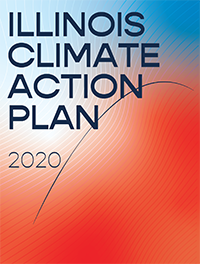You are here
About Us

Sustainability is: Meeting the needs of the present without compromising the ability of future generations to meet their own needs.
Welcome to the iCAP Portal, a real-time repository for Illinois Climate Action Plan ideas, efforts, and results!
Illinois Climate Action Plan
The Illinois Climate Action Plan (iCAP) represents our continuous commitment to environmental stewardship to honor the work of the recent past and advance toward a sustainable future. We further our pursuit of carbon neutrality while striving for holistic campuswide sustainability and strengthening our community resilience.
The first iCAP was written in 2010, and it is rewritten every five years. Older versions of the iCAP are available on this Portal.
Read the approved Illinois Climate Action Plan 2020.
Climate Commitments
The Illinois Climate Action Plan (iCAP) outlines a path for the University of Illinois Urbana-Champaign to achieve carbon neutrality as soon as possible, and no later than 2050. We committed to this goal in 2008 when Chancellor Richard Herman signed the American College and University Presidents' Climate Commitment (ACUPCC), later renamed the Second Nature Carbon Commitment for its emphasis on emissions.
In 2016, Illinois took on a greater leadership role when Interim Chancellor Barbara Wilson signed the ACUPCC’s sister pledge: Second Nature’s Climate Resilience Commitment, which charges campus to work with community partners to examine the vulnerabilities of our land management, infrastructure, and energy production. Together, these two commitments form Second Nature’s comprehensive Climate Leadership Commitments.
As a Charter Signatory to the Climate Leadership Commitments, the University of Illinois continues its dedication to being on the forefront of sustainable future planning. In fall 2019, University of Illinois President Timothy Killeen reinforced this commitment for all three campuses by signing the Climate Emergency Letter as one of more than 300 Global Universities and Colleges.
iCAP Portal
We launched the online iCAP Portal in 2012 to provide transparency regarding campus sustainability objectives, successes, and challenges. The Portal contains updates, historical context, metrics, and contact information pertaining to all current and past iCAP projects. Information collected in the Portal is shared with over 17,000 public visitors per year, used for reporting purposes, and serves as an excellent resource for university courses and independent student projects.
Projects in the iCAP Portal are o![]() rganized into ten themes: Energy, Transportation, Land and Water, Zero Waste, Resilience, Reporting Progress, Engagement, Education, Research Opportunities, and Funding. The project status is Proposed (before approval to proceed), In Progress (for projects actively being implemented), Ongoing (for projects that are running on their own or are a summary/header type of project), and Completed (for projects that are finalized). Cancelled projects are also included, for reference. There are also Project Collections for various topics.
rganized into ten themes: Energy, Transportation, Land and Water, Zero Waste, Resilience, Reporting Progress, Engagement, Education, Research Opportunities, and Funding. The project status is Proposed (before approval to proceed), In Progress (for projects actively being implemented), Ongoing (for projects that are running on their own or are a summary/header type of project), and Completed (for projects that are finalized). Cancelled projects are also included, for reference. There are also Project Collections for various topics.
Project pages all include a project description. We strive to include every campus sustainability project on the Portal, and some project pages only show a simple sentence about the project. Other project pages are much more descriptive, with backgrounds, contacts, dates, metrics, images, videos, location(s), etc.
The Objectives page is a dashboard of primary iCAP objectives from the most recent iCAP published. Each objective includes a unit responsible for leading the implementation of this objective, and an explanation of the objective, as written in the iCAP itself. When applicable, objectives also have associated metrics, showing progress over time. Each iCAP objective is also linked to a primary iCAP Portal project page.
The Map page shows the location of iCAP projects and available living lab facilities for research opportunities. It has many features, such as filtering the map to a specific theme.
If you would like to recommend a new project or are aware of an existing project that is not listed on this site, please use the Suggestions page to let us know.
Key Contributors
The iCAP Portal content and design is led by Facilities & Services (F&S) and the Institute for Sustainability, Energy, and Environment (iSEE), and the database/website administration is handled through the College of Education’s Office for Math, Science, and Technology Education (MSTE).
Major contributors include the iCAP Working Group and Sustainability Working Advisory Teams, under iSEE’s direction, as well as the Student Sustainability Committee, in Student Success and Engagement.
If you would like to be one of the key contributors to updating projects in the iCAP Portal, please reach out to us, through the Suggestions page.
